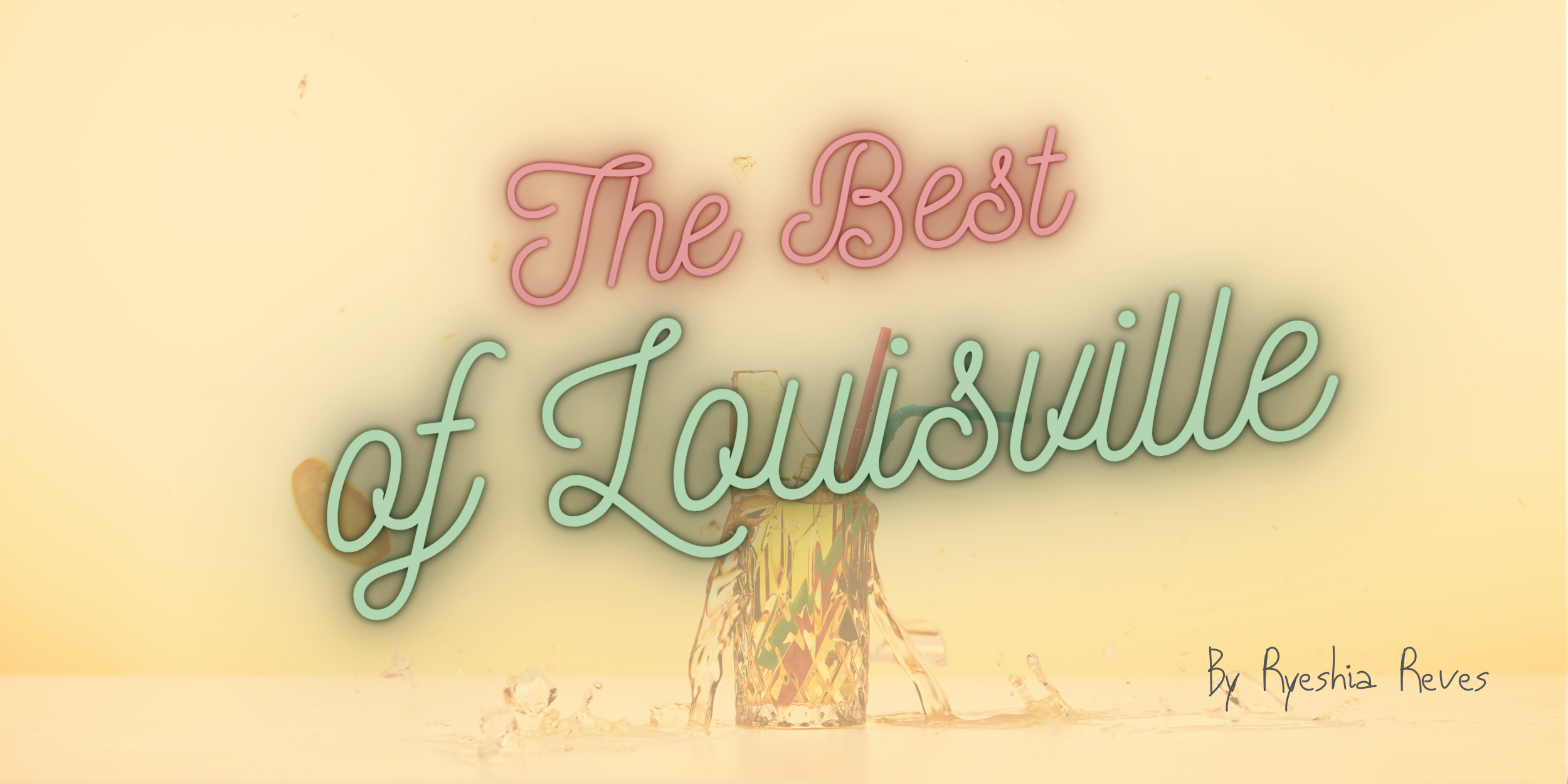
This article was supposed to be a chance to uplift and celebrate local bars and restaurants around Louisville that have created safe and enjoyable experiences for Black and brown employees. I set out to poll as many non-white service industry staff members as I could, but of the 15 folks I spoke to, only one person came back to me with a positive experience. Just one. So, it looks like we’re gonna have to have a talk.
Honestly, when I realized what was happening, I felt like a clown for thinking the situation would be different at all. After almost 15 years in this industry, what made me think I’d have a plethora of positive experiences to choose from? Was it the time that, even though I was the highest seller, I was still given the worst section in the restaurant? Was it when I was working at a now defunct pizza chain, the General Manager ripped my stockings and left bruises between my knees from trying so hard to pry them open? Or when at that same chain, I was made to vacuum all the booths while every other server pranced out the door?
The service industry has been trash on the racism front for a while now and we’re gonna talk about it.
A lot of these white servers out here think they’re slick. That they’ve got it figured out how they can be straight up racist, without being called on it. Except they aren’t. We know that “Canadians” are code for Black people. And if you didn’t, now you do. If you’ve worked in this industry you know that folks will always complain when they get a table full of black people, because they just never seem to tip well. Perhaps the reason you aren’t getting tipped is because you’re neglecting this table of Black folk who are regularly mistreated when they go out to eat -- unless they’re lucky enough to snag a Black server. Everywhere we go, we are treated like the lowest of the low, and we’re still supposed to pay you for that? No. Now, I’m a firm believer in tipping 20% or above whenever I go out, especially in a pandemic, but I will be goddamned if I reward racist behavior with my money.
Get real.
Restaurants are filled with complacent staff members. That same queer girl you work with who goes to all the marches and has that cute pixie cut? She’s playing the victim every time a Black woman calls her out. The white tears always flow. And while you’re swearing up and down that you believe and support Black women and believe Black lives truly matter, you’re cutting up with her in the service alley, or consoling her because that mean old Black girl was just too harsh. Aht Aht. Stop that. It’s past time for white service industry staff to start calling out their racist ass co-workers, even when their racism seems innocuous so that the few Black people you work with don’t have to. Because if you think we aren’t drinking in your passive racism, you’re out of your mind. It’s just adding one more burden we have to carry to support ourselves. It’s death by a thousand cuts and you’re demanding we smile while you slice away at us, so you don’t have to feel bad. But you should feel bad.
I honestly hope you do feel bad. You deserve it.
When you look at Black people in management, that number is embarrassingly low, and if you add Black women into the equation, that number drops even further. Ask yourself, when was the last time you had a Black woman as a supervisor? Hell, have you ever had a trans person as your supervisor? Do y’all just believe that Black and brown folks are just, as a whole, less capable or interested in leadership roles? And if not, then how do you explain the staggering lack of non-white leadership in the service industry? And let’s not even talk about non-white service staff and management in the front-of-house.
Throughout my career, I’ve only ever had two supervisors who were not white. That’s embarrassing.
How do we facilitate the transition from an industry based in white supremacy, to one that nurtures diversity and equity? Will we achieve that through yet another lackluster, off-the-mark, and insipid “diversity” workshop helmed by middle-aged, white, cisgender people? The answer to that is no. Stop doing it. Paying your Black and brown to employees lead the conversation, if they would like to, is a good place to start, but don’t expect that. If your staff doesn't want to take that labor on, they don’t owe that to you. Regardless, the onus is still on white business owners and management to do the legwork to find the Black and brown diversity, equity and inclusion trainers to educate white people who, for the most part, are not invested in not being racist [Editor’s note: Our frequent contributor Shauntrice Martin has done this work for the service industry].
Imagine having to deal with all these issues rooted in white supremacy and then add on the lingering fear of being undocumented. In a discussion with a friend of mine who is queer, brown, and undocumented, she expressed to me that she has never trusted any restaurant she’s worked at in Louisville enough to be open about her undocumented status. She’s never been able to be her true self. And although it's been several years since she left Louisville for greener pastures, her experiences are still relevant.
“I have to do a lot of mental gymnastics to make sure I’m not giving anything away,” she said. This means that she is unable to socialize with her co-workers. She’s isolated from the intimacy that folks who work as hard and as often as we do in the service industry maintain. To add to this, these restaurants are predominantly white, and so often there is zero Black presence. She believes that the service industry, a community that benefits greatly from undocumented workers, should speak out in support of hiring staff members without papers. To her, these are actions. This looks like overlooking state provided identification. When you hire one undcoumented worker, the word spreads, and your hiring power grows. Her worst experience was trying to do her taxes. The IRS reached out to her employer about her social security number not matching. Her right-wing boss harassed her to bring in all of her papers and hounded an 18-year-old girl about her legal status. This ain’t it. There has to be a better way to protect our community.
When I asked her about any highlights in her experience as an undocumented worker in Louisville, she had none to share.
I had the pleasure of speaking to a non-binary pal who gives Louisville’s service industry a 6 on paper. On the facade, Louisville cares. But on a more interpersonal level, the actions don't always line up with the words. Misgendering, abuse, and management not following through with being supportive of non-cis employees. In their experience, harassment of trans and non-binary folks isn’t taken as seriously as other types of harassment. To them, true support looks like basic respect. Being afraid of confrontation when it comes to defending and supporting our trans and non binary staff isn’t an option. When I asked about a low light of being trans/non-binary in the service industry, they mentioned the constant misgendering by customers. They understand we’re in the South and ma’am and sir feels respectful, but as they say “I’m not a man but ok.” As a highlight, they point out co-workers and management who speak up to customers and staff.
Because regardless of the situation, no one deserves to be misgendered.
So what do white people in the service industry need to be doing? Black people feel abused and unsafe in the Louisville restaurant scene. Trans folks feel abused and unsafe in the Louisville restaurant scene. Something is wrong here. This industry was built on something foul and insidious and it's time to cut the rotten part of the foundation. I can’t make grand, sweeping, statements about what needs to happen on a larger scale, as if I know all the answers. But I do know on a smaller scale that every day, white people need to speak up. You need to tell that white girl to stop painting Black women as bullies and be accountable for her actions. You need to let your co-workers complaining about “Canadians” know that's mad racist and you don’t want to hear it. Talk to your boss about hiring undocumented workers because its the right thing to do, and correct yourself and any person around you who isn’t getting someones pronouns right.
Maybe you can’t change the entire service industry, but you can change the space around you. And yes, I do still hope you feel bad.
Ryeshia Reves is an almost 30 yr old queer black woman. She spends her time working too much, loving on her small dog, getting her nails done, and wondering what the hell is wrong with y’all. Also she needs a nap.

